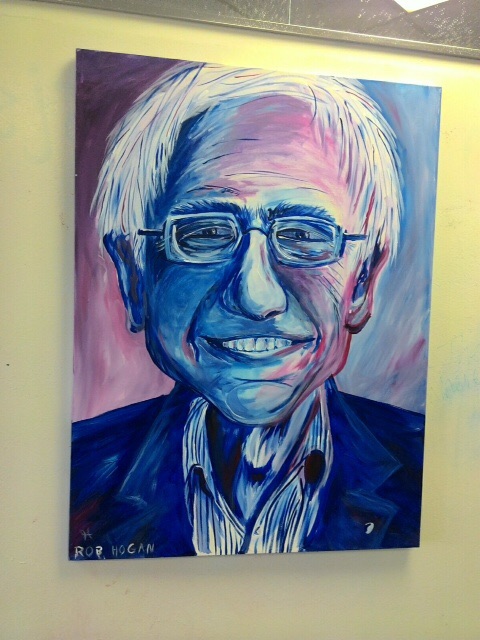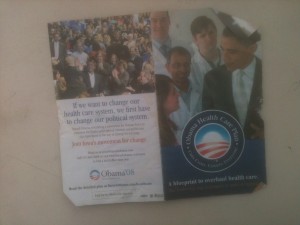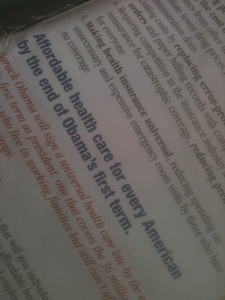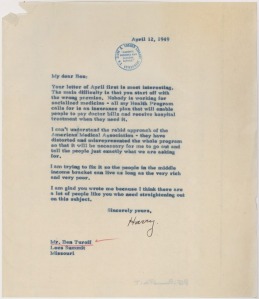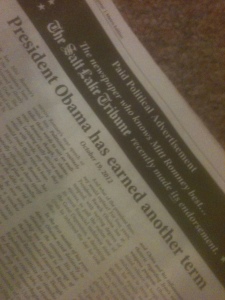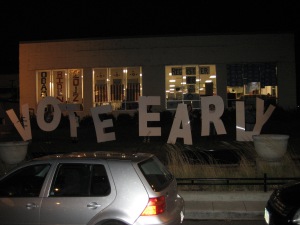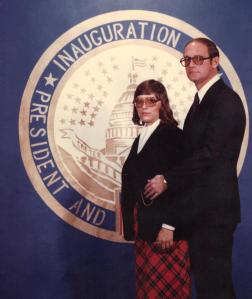Democratic Debate: HRC Regina
You have to hand it to Madame Secratary Senator First Lady Hillary Rodham Clinton, Esquire. When it comes to debating, she can flat out deal.
She knows how to land a point. She knows how to counterpunch. She knows how to give worse than she gets. She knows how to dodge a predictable line of attack. She even knows when to shut up and smirk while her opponents ramble incoherently (a surprisingly rare skill in egocentric politics).
Regular readers – both of you – know that we are fond of saying the politics is much more like a cage match than a chess match. Successful candidates hammer away with their “messaging” over and over without much in the way of subtlety. The most effective bludgeoner usually wins.
We saw an exception tonight, though. Consider the following topics:
- The so-called “reset button” with Russia
- The NSA’s dragnet on cell phone and email traffic
- Syria and the “red line” around the use of chemical weapons
- Wall Street as a source of campaign funding
None of these are particularly flattering to President Barack Obama. Most are distasteful to the most liberal wing of the Democratic Party. Yet liberal Senator Bernie Sanders was effectively neutered by an adroit Clinton. She positioned herself as an instrument and partner of President Obama and thus immunized herself from criticism of the still wildly popular president (wildly popular among Democratic primary voters and caucus goers, to be sure).
She was by far the most effective messanger on health care. Host Andrea Mitchell lobbed a question about single payer health care, a line of attack the Clinton campaign has trotted out over the last several days, claiming that Sanders’ liberal plan might undermine the progress of Obamacare.
Four days ago we saw Donald Trump clumsily make the argument that he was not questioning Ted Cruz’s eligibility for the office of president but that Democrats would, making Cruz’s eligibility a “legitimate campaign issue.” Trump was rightfully booed.
Here, though, Clinton made an analogous claim about the Sanders single payer health care plan, darling of the liberal left. “I’m absolutely committed to universal health care,” she said. She personally had nothing against single payer of course, but Republicans would fight it to the last man. She pointed out that the enemy camp had voted down Obamacare just days ago. Why not stick with Obama’s signature policy achievement, the Affordable Care Act? Unlike Trump, Clinton got away with the gambit unscathed.
Sanders fought, citing the 29 million Americans still without health care (side note: does that sound high? I’d like to see the fact check on that one) and said, “No one is tearing this up” of the ACA. But Clinton threw another jab at the several iterations of Sanders’ policy and again raised her unwillingness “to start over again with a whole new debate.” “We had a chance to vote for the public option,” she pointed out.
As as a Sanders supporter, it was especially distressing to see him founder on the gun issue again. Clinton hammered him in the last debate on this topic and he essentially repeated the same maneuvering mistakes that got him in trouble last time around. She again painted him as “a pretty reliable vote for the gun lobby” because he sided with gun manufacturers on several Senate votes. Sanders really should have developed a better response to the “soft on guns” charge, warranted or not. Called out by Clinton, Sanders could only stammer about “relooking” (sic) at gun control. Sanders might have done better to apologize for having only D- record from the NRA, gotten a laugh, and moved on to to more hospitable terrain. Having seen this exact line of attack in the last debate, Sanders needed a more effective response but fell well short.
Over and over, Clinton managed to underscore her own experience and toughness while avoiding out-and-out chest pounding. Using an oh-by-the-way style, she invoked “Hedge fund billionaires who are running ads against me right now and Karl Rove, who is running an ad against me right now.” These two bogeymen wouldn’t stop her, she implied, and neither would any other force from the right. “I know a little bit about this having spent many hours in the Situation Room advising President Obama,” she prefaced an answer on chemical weapons and the Assad regime. Without taking on Sanders directly, she underscored her policy experience.
Sanders scored best when he trumpeted his own independence, especially from corporate campaign contributions. “I don’t take big money from big banks; I don’t take speaking fees from Goldman Sachs,” he moralized. At one point he pointed his finger directly at Clinton while lecturing about Super PACs, earning an icy glare from the Secretary.
Lester Holt and co-host Mitchell held the candidates to account on time and on the questions, with the notable exception of Mitchell poking Sanders on his comments about Bill Clinton’s infidelities. Sanders promptly responded by mounting the pulpit for a bit of righteous media bashing, always popular among any electorate. “I’m going to debate Secretary Clinton on the issues facing the American people,” he thundered, an echo of his famous “The American people are sick and tired of hearing about your damn emails” line from the last debate.
Bottom line: Sanders was clearly uncomfortable criticizing the policies of a sitting Democratic president. He wasn’t able to effectively contrast himself with Clinton and he didn’t do anything that would shake up this race.
Note: Just like old times, I wrote this recap without any influence from experts, talking heads, campaign spinners, or even basic fact check. The goal is an unbiased and honest reaction to the debate. Other viewpoints are welcome.
A Fierce First Day On The Trail
Check out this painting on the wall of Bernie’s HQ. Frightening or awesome? I say a little of both.
I hit 45 doors today on Bernie’s behalf. The high was about 22 degrees. Tomorrow it’s supposed to get up to 12, and Sunday’s forecast is for a high of negative 2! I kept warm by imagining all the Hillary supporters shivering in their headquarters, too cold to venture out into the streets. Come on people, elections are won one door at a time.
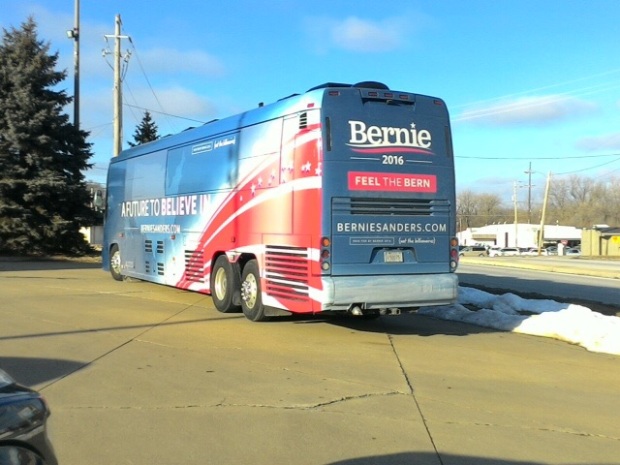
People I talked to were receptive and friendly. Anecdotally it doesn’t seem like we are anywhere near the level of saturation I observed in the run up to the 2012 general election.
Guess whose Beaverdale door I knocked on? Kathy Obradavich, famed and feared chief political correspondent for the Des Moines Register. I fawned over her just like the huge fanboy I am and she was even gracious enough to take a selfie with me.

Three Years Later…
We’re back in Des Moines, Iowa for some pre-caucus campaigning!
As expected, Hillary Clinton is the front runner, but Bernie Sandes is putting up a surprisingly serious challenge. Check out the adorable graphic on the cover of yesterday’s Des Moines Register:
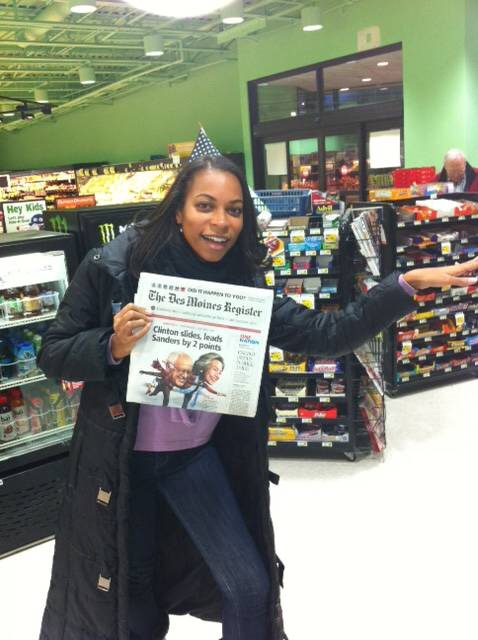
Lately Bernie has narrowed the gap to just a handful of percentage points and supporters here on the ground are jonesed! You can just make out poor Martin O’Malley sprawled on his behind in the background behind the two front runners.
Bernie’s regional HQ is actually right next door to the Harding Hills Hy-Vee, where faithful readers will remember many cold but happy days spent doing visibility work to drive out early voters in the general election three years ago.
Ruth and I (by the way, we’re married now!) have already caught up with some of our favorite Iowans, including Bob, Kathy, Zoey, CeCe, Linda and Kim. And we even met Nate Silver, the data-crunching genius behind fivethirtyeight.com and late of the New York Times.
If you’d like to catch up, send me a message on Facebook (I promise to check it this weekend) or text me!
The Promise
Four years later, the brochure is creased down the middle and worn at the corners.
Tens of thousands of copies were printed during the 2008 election to persuade Iowans, but one of them returned somehow, four years later, to an Obama campaign office in Des Moines.
Inside, the pamphlet lays out the blueprint for what would become known – first mockingly, and later proudly – as Obamacare. The message is tailored, using state-level facts and figures to make the case for universal health care to skeptical Iowa residents.
Campaign “lit,” as the staffers call it, is distributed like confetti during races – by mail, at events, and left on doorsteps. Inside a typical piece, flattering photographs show the candidate shaking hands with senior citizens and gesturing to rapt audiences.
Obama’s old health care piece reminds readers of the long, sad history of the drive for universal health care. Franklin Delano Roosevelt, Truman in 1948, Nixon, Clinton – all had called for health care legislation establishing universal coverage but failed.
Each of those previous attempts didn’t work, the brochure argued, because entrenched interests banded together to preserve the status quo. This time, according to the pamphlet, something would be different.
The Prediction
Barack Obama’s voice was hoarse and even cracked a few times, but he asked for Iowa’s six votes on Monday night at his final campaign appearance.
My guess is that Obama will amass around 300 votes in the Electoral College to comfortably win a second term. The popular vote will be quite close, but his leads in the important swing states are substantial enough that the outcome will never be in real doubt.
I mostly base this forecast on close readings of Nate Silver’s FiveThirtyEight blog and the Cook Political Report, but I have to admit I’ve allowed anecdotal evidence to creep into my prediction. It would be hard not to after all the time I’ve spent on the ground here in Iowa.
One Saturday a couple of weeks ago, I was out canvassing on Euclid Ave. in Beaverdale when I reached a white house with no doorbell. I tried the front, but my knock was muffled by the locked screen door. I went around to the back.
I knocked on the back door. A young woman in her mid-twenties answered holding her baby. I introduced myself, then told her that according to the campaign’s records, she had a mail-in ballot that she hadn’t yet turned in.
“Oh right,” she said. She and her fiance had been meaning to complete their ballots. I made her a deal: I would return in an hour or so, when her fiance would be home, and I’d collect both ballots.
I returned to my canvassing rounds, but got distracted. By the time I made it back to her house, three hours had passed and it was dark.
I went around to the back door again. I felt a little creepy knocking on the back door this late at night, but I did it anyway. A young man a few years younger than me answered. He had tattoos lining his forearms and climbing the sides of his neck. I apologized for coming by so late and told him I had come back for their votes.
“My fiancee said she wanted to get them done, but I’m not sure where she put those ballots,” he told me. His fiancee had gone out with friends (it was a Saturday night) and wouldn’t be back until much later. He agreed their votes were important and promised to get them in soon, though.
Over the next few days, I kept thinking of the couple. I kicked myself for not returning sooner. I had promised to return in an hour; it had been about three before I came back. To judge from appearances, these were classic “low-propensity voters,” well-meaning, but with a young baby and a thousand other cares, prone to prioritize other activities ahead of voting. I had blown a perfect shot to collect two votes; and those two could very well flake.
One evening, I decided to pay them a third call and ask for their ballots again. I kept getting the nagging feeling that if I didn’t ask, those two votes would be lost. It was dark again, but by now I was an old pro at getting through their backyard in the twilight. Again the young man answered.
“You must think I’m crazy by now,” I said. I told him I was passionate about seeing Obama win the election. I hoped he would excuse my stalking. Did they have their ballots?
“We filled them out and dropped them off at the Obama office on Ingersoll yesterday,” he told me. “We know it’s important, too.”
The Procrastinator
Her absentee ballot request form was printed out, completed, signed and sealed, but Paige Stewart never quite put it in the mail.
The 27-year-old is studying for a masters degree in psychology in San Deigo but hasn’t found a permanent address there yet. She realized on Friday that she had let the deadline for turning in her absentee ballot back in Iowa lapse.
“I talk this talk but I’m not walking the walk,” Paige says. “It came from a place of forgetfulness.” She decided that she’d just have to fly home to vote on Tuesday.
She bought a last-minute ticket from San Diego to Des Moines, one with two connections. She’ll be leaving this evening at 8:30, stopping in Denver, then Minnesota, then finally arriving in Des Moines at 11 a.m. on Election Day. “I have some homework and some serious reading to do,” she says.
How much did the ticket cost? “I don’t want to think about it,” Paige says.
Paige isn’t as worried as some about the tight election here in Iowa. “Iowa is a little ahead,” she says. Her vote is “more a commitment to inner values.” But with the vote cast, she says she hopes “something beautiful will come out of this.”
The Endorsement
When the Des Moines Register endorsed Mitt Romney over Barack Obama, it sent Democratic Iowans into a frenzy.
Not content to simply cancel their subscriptions, a group of Iowans took out a full-page ad in the Sunday Register a week after the endorsement and reprinted in full the Salt Lake City Tribune’s endorsement of Barack Obama.
Iowa Democrats took up a collection to raise the $15,500 they needed to run the ad. “It was really kind of a caper,” said Susan Webster, who posted about the plan on her Facebook page and helped gather the money. “We drove around and collected money from people who were out of the town.” The planners used Cownie’s Fur, owned by Iowa Mayor Frank Cownie, as their base of operations, Susan said.
“We know a lot of the writers and we know their work,” Susan said. She wishes some of her favorites were part of the editorial board that issued the endorsement. “It was a giant blow to our trust.”
Further down on the page, the ad reproduced endorsements from other regional newspapers and listed the names of the people who contributed to its cost.
“People were just aghast and shocked,” said Marilyyn Wadden, She says she made a “minor little donation” when she heard of the “buzz all over town.”
Her husband Jerry called the endorsement a “corporate decision” and suspected that dollars and cents were influencing paper’s editorial judgment. “It was so inconsistent with the values of the Des Moines Register,” he said. “I’ve read the Register for 64 years religiously, day and night for half of those years. That was not the paper I’ve read for 64 years. That was a different animal.”
The presidential candidate with the Register’s endorsement has won Iowa in almost every election, with the exception of George W. Bush’s win over John Kerry in 2004. It was the first time the broadsheet had endorsed a Republican since Nixon.
Lindsey
It’s freezing cold and the sun set over an hour ago, but that doesn’t stop Lindsey Petersen Swan. “Fired up!” she screams at a group of about a dozen teens. “Ready to go!” they holler back.
It’s a Thursday night at the Obama campaign office, and Lindsey and I are keeping an eye on the teens while they parade outside the office, a display intended to attract the attention of traffic passing by on Ingersoll Ave. The kids have signs, noisemakers and giant letters spelling out “Vote Early.” Despite the frigid temperatures, one girl wears shorts and doesn’t even have a coat on – she claims not to be bothered by the cold.
Lindsey turns to me and laughs at the spectacle: a dozen or so excited teens and and the two of us whooping and making noise in the darkness. “I’m just a big kid,” she says.
Lindsey and her sister Leslie were raised in Clear Lake, Iowa, about a two hour drive north of Des Moines. “To me, it wasn’t weird to have politicians in my house,” Lindsey said. Her parents, Dick and Marlene Petersen, were involved in Democratic politics in Iowa and nationally. Lindsey’s house was constantly the staging area for canvass shifts and phone banks.
Lindsey’s father was a stern taskmaster. “It wasn’t ‘Do you want to call?'” Lindsey said. “It was ‘Here’s your packet.'”
Leslie, though two years younger, was more outgoing and willing to talk to strangers – “I was always kinda nervous to call,” Lindsey said. The girls would go door to door together on cold days, then return to the house for a bite to eat. “I remember going to get a bowl of chili from a crock pot after we’d finished out canvass shift,” Lindsey said. “Everybody else would be tired and hungry. We’d be ready to go.”
Gangnam Style is what the kids are listening to these days – a catchy, viral Korean pop song from artist PSY, who performs a “horse dance” in the nonsensical music video. Lindsey and two teenage girls watch the video while we take a break from the cold and get something to eat. Lindsey tries to teach the dance to two sisters, 16-year-old Ashlin Alex and 13-year-old Zoey Wagner. “Left, left, right, right, left, right,” she says while whirling a pantomime lasso. The girls think this is hilarious.
“Stepping into this house is like stepping into a time warp,” Lindsey says.
When Lindsey was in school, she invited Dick Clark, then the junior senator from Iowa to speak to her government class. Her classmates pooh-pooed the idea that a sitting U.S. senator would be addressing them, but they were soon proven wrong. “I introduced him as ‘my friend,'” Lindsey said. Her schoolmates were soon sucked into politics as well. “All my friends were happy because I got them out of school to canvass,” Lindsey said.
On January 17, 1971, South Dakota Senator George McGovern announced he would run for President of the United States. Known for his fierce opposition to the raging Vietnam War, McGovern would eventually win the Democratic primary with a platform of economic populism and grassroots organizational techniques.
McGovern’s campaign was badly damaged, though, by the revelation that his pick for vice president, Thomas Eagleton, had undergone electroshock treatment for depression. This wasn’t acceptable to the American public and Eagleton was forced to resign from the race. Compounding McGovern’s embarrassment, five prominent Democrats refused McGovern’s offers to become his new vice presidential nominee. In McGovern’s own words, the damage to his campaign was “catastrophic.”
But all nine-year-old Lindsey Petersen knew was the rush of campaigning for the first time for a man who stood for the poor and against Vietnam. At Dick and Marlene’s house, “We actually did have a computer,” Lindsey said. “It printed on those green and white spool papers.”
Lindsey and Leslie were younger than everyone else involved, but her house was filled with “cool people who were older than us who we could talk to,” she said.
“I remember watching the election returns from the campaign headquarters,” she said. McGovern lost the Electoral College to Richard Nixon by a score of 520-17, horrifying Lindsey and Leslie. “We were absolutely devastated.”
Inside the Obama headquarters, a boy named Carlos with an enormous Afro is putting the finishing touches on a posterboard sign. He had drawn a gigantic O, intended to be the first letter of Obama Volunteers, but hadn’t fully considered how the rest of the phrase could fit on the paper. “Dude,” Lindsey says, “where are you going to put the ‘volunteers?'” Lindsey asks him. “He was all enthusiastic with his O,” she tells me, pointing to the “bama volunteers” in tiny script following the O.
Lindsey’s involvement in the 2012 campaign started with the chance decision to attend an Obama rally earlier this summer. While she was picking up her ticket before the rally, she struck up a conversation with the young woman manning the ticket distribution table. It had been over 30 years since Lindsey had been involved in any campaign, but she remembered how much fun it had been as a kid. The young woman held a quick and whispered consultation with a colleague, then gave Lindsey a pair of red VIP tickets, tickets that would get her much closer to the president. “Maybe this will convince you to come volunteer again,” the young woman said.
Dick Petersen, Lindsey’s father, died in February of 1977, the victim of a massive and unexpected coronary on his daughter’s sixteenth birthday. During his eulogy, Lindseyfound out that he had decided to make a bid for U.S. Senate just a few weeks before he died. Her uncle and her father talked over the plan while the family was snowed in during the days that followed Jimmy Carter’s inauguration.
Her mother, who had been a campaign manager and a tireless activist, stepped back from such heavy involvement. “She just lost her passion for politics,” Leslie said of her mother. Five years later, Marlene died at a young age, too. Leslie was still in her teens.
“That’s when I stopped doing political stuff,” Lindsey said. Whenever she’d have offers to get involved in other campaigns, she would pull back. “No,” Lindsey would tell them. “I just can’t.”
Most mornings, either Lindsey or her husband browses the news online as soon as they wake up. It was Lindsey’s turn to look a few weeks ago when she discovered McGovern had died. “It seems really poignant that this is the election I got involved again,” she says. “I think there is a circularity to these things.”
Work the Phones
Hey there, non-swing state readers!
Do you want to help Barack Obama out over the last couple days of the election?
You can, by calling voters in critical swing states (maybe even here in Iowa!) to remind them what’s at stake in this election and making sure they are ready to vote. You could even set up your own phone bank with a few friends (it’s much more social to call with a few other people). All you need is a telephone and an internet connection.
You can get started by clicking here to go to the campaign’s website. Once there, you can to choose “Call Voters” using the online call tool to any state – but to judge from the president’s travel schedule for Monday, we need calls most in Ohio, Wisconsin and Iowa.
The campaign-provided phone script reminds people to vote and makes sure they know where they can vote. You don’t have to follow it exactly as long as you stick to those two goals – in fact, we encourage volunteers to make their own pitches about why they personally support Obama.
Most of the people won’t be home and others will be tired of the long campaign, but please don’t get discouraged. Sharing a brief personal story about yourself and why you’re calling can make a difference, one voter at a time.
Ruth and I are working hard on the ground in Iowa to reelect the president. Can you spare an hour or two to help us?
Obama To Finish 2012 Campaign With Mid-Western Tour
Barack Obama will finish his reelection campaign on Monday with a swing through Wisconsin, Ohio and Iowa, where wins in all three states would all but ensure him a second term as president.
Obama will speak at rallies in Madison, Columbus and Des Moines. Bruce Springsteen will perform at all three capitols and Jay-Z will be on hand in Columbus, the campaign said Thursday afternoon.
It can hardly escape notice: without an upset in one of the reliably Democratic states, winning all three states would give Obama exactly 271 electoral votes, the minimum number to win the election even in the unlikely event the rest of the swing states slip away.
Nate Silver’s excellent 538 blog says that Obama enjoys a good chance to capture all three states, as do recent polls. The campaign brain trust must believe that trying to bulwark the three critical states is the best way to cement an Election Day win.
It is possible the the Obama campaign could boost its chances of winning by a large margin of electoral votes by directing its last-minute efforts at Florida, Virginia or other states where Obama’s electoral advantage isn’t as pronounced. My guess, though, is that they would prefer to have greater certainty of eking out a win by a few electoral votes even at the expense of tilting their fortunes to a greater degree in one of the other battleground states. Thus they have chosen to spend their most precious resource at this stage of the game – the candidate’s time – on the three swing states they can fall back on even if all else fails.
Iowans will find a poignancy to hosting the campaign’s final event on Monday night. Many proudly label Iowa as “the state where it all began,” citing Obama’s unexpected win of the 2007 Iowa caucuses as the event that established the legitimacy of his original campaign.
